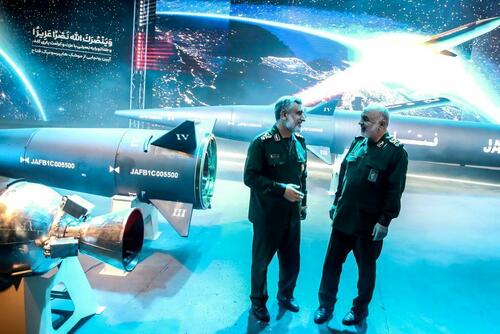
In fresh statements aired by state media and picked up by Al Jazeera and other international sources, Iran says it has not only achieved hypersonic cruise missile technology, but is actually testing hypersonics, in what would mark a historic breakthrough for the Islamic Republic if true.
The missiles are reportedly currently undergoing tests and flight trials, which "will mark the beginning of a new chapter in the defense power of our country," state media Tasnim announced Wednesday.
Tasnim further touted that the new hypersonic weapons could "significantly accelerate the Islamic Republic of Iran’s response time in case of any combat, and take away attacking forces’ opportunity for reaction."
It was in early June that Iranian President Ebrahim Raisi attended a ceremony unveiling the new Iranian-made "Fattah" (literally, "Conqueror") hypersonic missile in Tehran. This was met with some degree of skepticism internationally, given the immense difficulty behind mastering the technology.
Raisi touted at the time: "Today we feel that the deterrent power has been formed." He added, "This power is an anchor of lasting security and peace for the regional countries."
The Iranians say their new hypersonic missile can reach nearly 900 miles and it cannot by countered by conventional anti-air defense systems. Iranian officials say it can also reach speeds of up to Mach 15. But expressing skepticism, here's what Popular Mechanics has written [emphasis ZH]:
Unfortunately, the "hypersonic" term is often used deceptively to imply more advanced technology than what is actually present. By definition, hypersonic describes a missile/aircraft traveling at or over five times the speed of sound, or a mile per second. That’s certainly fast, but ballistic missiles have been rocket-boosting themselves up to hypersonic speeds since the 1950s and 60s.
However, the modern usage of "hypersonic weapons" refers to weapons that can sustain and maneuver at hypersonic speeds. One method of achieving this is to have a ballistic missile launch what’s called a hypersonic glide vehicle into the exosphere—a vehicle that’s then able to skip-glide just over the atmosphere, repeatedly bouncing off the dense air molecules below. The other method is to develop a cruise missile with an air-breathing ramjet motor that can sustain hypersonic speeds while within the atmosphere.
And what makes a hypersonic a hypersonic? According to more:
The big deal with these weapons is not their maximum speed. Rather, the appeal comes from their sustainable speed, flatter—and thus stealthier—trajectory, and ability to maneuver and avoid entering the optimal engagement radius of air defenses. Those all significantly complicate hitting them with interceptor missiles.
Given the Iranians already unveiled in early summer that they have achieved hypersonic missile technology, this new announcement seems a reaction to specific geopolitical events in the gulf region, namely the US decision to send 3,000 additional troops aboard two warships.
The US is considering deploying troops to commercial vessels in Gulf amid Iran tensions, but 5 unnamed US officials stressed to the that no final decision has been made, according to the Associated Presshttps://t.co/1xmmKWYNOf
— Middle East Eye (@MiddleEastEye) August 5, 2023
The timing of the hypersonics announcement further comes just as the Pentagon is seeking to put US Marines on international tankers in the Strait of Hormuz, in order to safeguard them from Iranian hijacking. Iranian Brigadier-General Abolfazl Shekarchi earlier issued the following response, asking, "What do the Persian Gulf, the Gulf of Oman and the Indian Ocean have to do with America" He further posed rhetorically, "What is your business being here?"
Iran has repeatedly rejected the US military involvement in regional waters, saying it only serves Washington’s interests, and is really intended to thwart Iran's own crude exports, which are also under US-led sanctions.
In fresh statements aired by state media and picked up by Al Jazeera and other international sources, Iran says it has not only achieved hypersonic cruise missile technology, but is actually testing hypersonics, in what would mark a historic breakthrough for the Islamic Republic if true.
The missiles are reportedly currently undergoing tests and flight trials, which “will mark the beginning of a new chapter in the defense power of our country,” state media Tasnim announced Wednesday.
Tasnim further touted that the new hypersonic weapons could “significantly accelerate the Islamic Republic of Iran’s response time in case of any combat, and take away attacking forces’ opportunity for reaction.”
It was in early June that Iranian President Ebrahim Raisi attended a ceremony unveiling the new Iranian-made “Fattah” (literally, “Conqueror”) hypersonic missile in Tehran. This was met with some degree of skepticism internationally, given the immense difficulty behind mastering the technology.
Raisi touted at the time: “Today we feel that the deterrent power has been formed.” He added, “This power is an anchor of lasting security and peace for the regional countries.”
The Iranians say their new hypersonic missile can reach nearly 900 miles and it cannot by countered by conventional anti-air defense systems. Iranian officials say it can also reach speeds of up to Mach 15. But expressing skepticism, here’s what Popular Mechanics has written [emphasis ZH]:
Unfortunately, the “hypersonic” term is often used deceptively to imply more advanced technology than what is actually present. By definition, hypersonic describes a missile/aircraft traveling at or over five times the speed of sound, or a mile per second. That’s certainly fast, but ballistic missiles have been rocket-boosting themselves up to hypersonic speeds since the 1950s and 60s.
However, the modern usage of “hypersonic weapons” refers to weapons that can sustain and maneuver at hypersonic speeds. One method of achieving this is to have a ballistic missile launch what’s called a hypersonic glide vehicle into the exosphere—a vehicle that’s then able to skip-glide just over the atmosphere, repeatedly bouncing off the dense air molecules below. The other method is to develop a cruise missile with an air-breathing ramjet motor that can sustain hypersonic speeds while within the atmosphere.
And what makes a hypersonic a hypersonic? According to more:
The big deal with these weapons is not their maximum speed. Rather, the appeal comes from their sustainable speed, flatter—and thus stealthier—trajectory, and ability to maneuver and avoid entering the optimal engagement radius of air defenses. Those all significantly complicate hitting them with interceptor missiles.
Given the Iranians already unveiled in early summer that they have achieved hypersonic missile technology, this new announcement seems a reaction to specific geopolitical events in the gulf region, namely the US decision to send 3,000 additional troops aboard two warships.
The US is considering deploying troops to commercial vessels in Gulf amid Iran tensions, but 5 unnamed US officials stressed to the that no final decision has been made, according to the Associated Presshttps://t.co/1xmmKWYNOf
— Middle East Eye (@MiddleEastEye) August 5, 2023
The timing of the hypersonics announcement further comes just as the Pentagon is seeking to put US Marines on international tankers in the Strait of Hormuz, in order to safeguard them from Iranian hijacking. Iranian Brigadier-General Abolfazl Shekarchi earlier issued the following response, asking, “What do the Persian Gulf, the Gulf of Oman and the Indian Ocean have to do with America?” He further posed rhetorically, “What is your business being here?”
Iran has repeatedly rejected the US military involvement in regional waters, saying it only serves Washington’s interests, and is really intended to thwart Iran’s own crude exports, which are also under US-led sanctions.
Loading…





